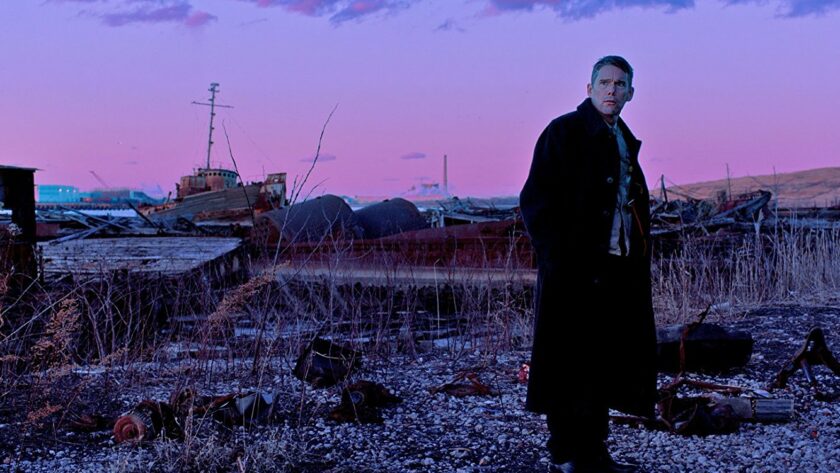Milo Garner reviews Schrader’s drama thriller.
Paul Schrader has always been a director influenced by the high arts of cinema, though a cursory browse of his filmography might initially belie this assessment. His work is often pulpy, revelling in violence and pornography in a manner that would make the old masters squirm; yet his influences are never deeply-hid. Reflecting what Greg Cwik has named a ‘citational cinema’, his passion for the ‘transcendental style’ of Ozu, Dreyer, and particularly Bresson is an ever-simmering theme of his oeuvre. Taxi Driver, Schrader’s breakthrough screenplay, is in some senses a soft remake of Bresson’s Pickpocket, a film that encapsulates Schrader’s obsession with the alienated loner drifting into ruin. But even with that in mind, First Reformed feels removed from Schrader’s earlier work. It carries not only thematic and visual cues from the cinematic pantheon he so reveres, but also a tone unique to their style of slow cinema. In Ozu’s geometric fashion, all but five shots are entirely still (those exceptions with good reason), and their composition dark and painterly. Alexander Dynan’s digital cinematography excels in the low light, and is at its most expressive when characters seem to slip into the black completely, literally or otherwise. If this precise composition and visual austerity recalls Dreyer, the framing device is borrowed directly from Bresson, though the journal of the film’s sickly pastor is as much Taxi Driver as it is The Diary of a Country Priest.
But the reference felt clearest is to Bergman. The film is – especially for its first half – essentially a remake of his magnum opus Winter Light. They both begin in a church, its parishioners few and sparse. Following a sermon’s close, pastor Toller (Ethan Hawke) is approached by Mary (Amanda Seyfried), a pregnant woman afraid for her husband (Philip Ettinger). He has been ruminating, and behaving unusually – he finds himself obsessed with climate change, and the man-made apocalypse soon to engulf the world. In Winter Light pastor Ericsson is also approached by a worried wife, her husband caught in a similar angst regarding a supposedly oncoming nuclear catastrophe. Both are narcissistic in their certainty of doom and destruction, but more telling is the response of the priests in question. While Toller is certainly more effective in his disputation than the more dismissive Ericsson, both fail to address centrally the concerns of their subject, and both ultimately turn the discussion onto their own failings and regrets. Though First Reformed will dally in other plotlines for a while, both films result in the depressed husband killing themselves, and our pastor protagonists despairing in their failure to save a soul.

For Bergman, the silence of God is his primary theme, his story paying particular attention to a frayed relationship between the schoolteacher Märta and Ericsson. Schrader quotes Märta in his similarly bespectacled Esther (Victoria Hill), and one interaction between her and Toller is taken directly from Bergman’s film; but the focus of First Reformed lies elsewhere. Schrader instead homes in on the purpose of the modern Church, and of a priest in it. This is first clear in his presentation of the wider Church – the titular First Reformed parish is connected to the larger Abundant Life mega-church, a towering temple equipped with three enormous screens, state-of-the-art sound, and seating for thousands. A distinctly American phenomenon, Schrader digs further than the corporate appearance of the building itself, directing ire toward the ridiculous Christian prosperity theology that claims a shockingly significant following in the States. It was only this May that the infamous televangelist Jesse Duplantis requested donations from his followers for a 54-million-dollar private jet (his fourth), under the justification: ‘if Jesus was physically on earth today he wouldn’t be riding a donkey.’
While this thematic direction has its interest, and is certainly justified, it is where Schrader’s limitations are first made clear. His delivery is often blunt, with a repetition and redundancy quickly becoming apparent. Shortly after a scene with a youth group, in which an obnoxious conservative declares that he shouldn’t have to support the poor (they’re lazy, he says), we have a scene of Toller outwardly explaining the exact phenomena we just bore witness to with his superior, Jeffers (Cedric Kyle). Jeffers gives some platitudinal response about violent video games and social media, but the scene itself serves no purpose other than to make sure the audience understood that a) the conduct in the previous scene was ill, and b) that it made Toller very angry, which was already implicit.

Schrader’s more essential point seems to concern the position of a priest in the world at all – is it better to be commercial and mainstream, to touch many lives if only a little? Or rather uncompromising, intellectual, and ultimately righteous, dedicated in the service of the Lord and his creation? I am reminded a little of the dilemma in Scorsese’s Silence, which also contrasts an idea of absolute faith against a more pragmatic approach to religion, if no less true in nature. It also reflects Bergman once again, though this time not Ingmar – rather his father, Erik, a pastor who had initially rejected a position in Stockholm to remain with his (reluctant) flock in the relative wilderness. Like Erik, Toller’s church is of little importance in the larger scheme, and this permits his idealistic tendencies. Jeffers at one point reminds him that Abundant Faith is somewhere that offers religion and worship to thousands – a responsibility that trumps the high-minded philosophies of church intellectuals. While clearly lampooning Jeffers and his corporate-church, Schrader’s critiques of Toller are not hollow – like his many alienated protagonists, it cannot be said that Toller is wholly good or wholly righteous.
With this is linked the film’s other central concern, that of the climate change espoused by the doomed husband from the film’s start. While Toller does not appear particularly concerned with the fate of the planet at the film’s beginning, his meeting with Michael seems decisive. Serving as priest at his protest funeral (to the sound of Neil Young’s ‘Who’s Gonna Stand Up’, in a dryly humorous rendition by a church choir), he soon finds himself embroiled in the climate activism of his late parishioner. Most pressing is his discovery that one of Abundant Life’s key contributors is a certain Edward Balq (Michael Gaston), an energy mogul who ranks highly among the world’s polluters. Jeffers rebukes Toller’s new calling as political – a church cannot be political – whereas Toller considers it as Godly, a defence of his creation.

This dynamic functions best when it is placed on these almost abstracted grounds – the actual nature of climate change is somewhat irrelevant to the personal and religious crisis that consumes Toller, one where he is made ever more aware of his inability to affect the world or protect his parish. But Schrader seems to disagree, with Owen Gleiberman comparing the environmental extremism of the film to a ‘policy statement’. Schrader is want to include generic statistics into his dialogue, such as the dubiously applied claim that 97% of scientists are in consensus regarding climate change, or dropping in the fact that Congress does not accept man-made climate change as factual. Schrader’s aims are noble, but as abovementioned, blunt and contrary to the contemplative tone otherwise so effectively conveyed. The film’s most overtly expressionistic scene comes off as less Tarkovsky (as it appears to reference) and more an arthouse WWF advertisement for much the same reason; the fears and realities of climate change are best articulated elsewhere, as here they infringe on Schrader’s own artistic successes.
It is this unrefined style that slowly leaks into the narrative in general as the film enters its final act. Xan Brooks notes a ‘faintly hysterical air’, while Gleiberman celebrates the ‘highbrow exploitation film’ First Reformed reveals itself to be. For the latter, it is a reflection of the pulp that Schrader so often coats his films in, this time creeping into the austere 4:3 frame of Christian contemplation. And in a sense it is the most assuredly Schraderian element in the film, one that even invites a moment of the ultraviolence so infamous in many of his scripts. But my feelings lean toward Brooks; the ever more ridiculous trajectory of the film undermines its intellectual bent, transforming the corroded Toller into little more than another projection of Travis Bickle; a Holy Man who needs his release, no matter what. This is clearest in the ending, in which Hawkes’ tenacious and brooding performance is suddenly unleashed, resulting in physical contortion and animalistic grunts of anguish. The art/pulp is fascinating to see play out, and the Night of the Hunter-meet-Vertigo-meet-Schrader final shot is bracing in its abruptness. But it is at once deflating – for the initial half of First Reformed, Schrader was aping Bergman and, with rare talent, succeeding. By the conclusion it is pure Schrader; for better, or indeed, for worse.
7/10
First Reformed is out July 13th in the UK. Trailer:




